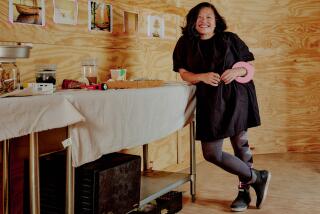S. Korea Serves Up Anti-Waste Campaign
- Share via
SEOUL, South Korea — When employees clean their plates in the company cafeteria, they get a prize.
Restaurants get tax breaks for serving a “model menu” to cut waste.
Some restaurants encourage customers to take leftovers home in doggy bags. “But this is kind of new to us and many customers think it’s odd,” said restaurant manager Koh Jae Young.
This is South Korea’s war on leftovers--a slow-moving fight to reduce the millions of tons of food thrown out by Koreans every year.
It’s aptly called the “Food Culture Improvement Campaign,” and is aimed at the heart of Korean eating traditions.
“Our customs are different,” said Ji-Youn Lim, a researcher at the Korean Federation for Environmental Movement. “A lot of waste is generated in Korea because of our culture.”
The government says about 32% of all garbage in South Korea is food. But one environmental group contends it is more like 38%, and a consumer group says 49%. That compares with 25% in Canada and 28% in Germany.
Whatever the figure, there is widespread agreement that tradition is partly to blame.
A traditional Korean meal is a table nearly overflowing with dishes, a superabundance of spicy tastes and smells. It includes a rice bowl, soup, stew, main dish and five or six side dishes of vegetables, seafood or meat, eaten today with a stainless steel place setting of two chopsticks and a spoon.
Because of the feeling of bounty and plenty that it gives, Koreans routinely cook more at home than they can eat and restaurants serve more than any customer could reasonably consume.
“Koreans are used to thinking ‘the more the better,’ ” said Koh, the restaurant manager.
It’s a philosophy the government is battling to change. In the latest round, the government announced on Dec. 6 that it will make a major push in 1997 to cut food waste by half.
It said the effort will include requiring open-air markets, department stores and other public facilities to reduce garbage. The government also will sweeten its incentive program for “model restaurants” by adding a 30% cut on water rates to the tax breaks already offered.
At previous government prompting, company cafeterias and some restaurants in recent years have started programs such as designating one day every week as “No Side Dish Day.” Some companies also punish wasters and give small prizes to those who clean their plates.
An electronics company fines employees the equivalent of $1.25 each time they turn themselves in for leaving food on their plates. A chemical company uses embarrassment: A scale is set up in the cafeteria and employees, in plain view of co-workers, must weigh what is left on their plates.
Rewards at companies include fruit, candy or a free drink. One manufacturer also gives a $6 gift certificate from a book store to each of 10 employees who do the best job of cleaning their plates each month.
Many Koreans say they are careful at home to eat leftovers the next day. But restaurant waste, which the government says accounts for 42% of food garbage, is a tougher problem.
Some restaurants have reduced side dishes slightly, but others say they are hesitant to tamper with portions for fear of alienating customers. They say the idea of taking table scraps home in a bag is catching on a bit, but still is unseemly to most Koreans, who fear they will appear to others to be poor.
The government says the country’s 45 million people throw away nearly 48,000 metric tons of garbage a day.
Population density makes it hard for the government to open new landfill or waste treatment sites without an uproar from nearby residents. And the nation needs more of everything--treatment facilities, recycling centers, composting sites and plants to turn waste into animal feed, said H.K. Shin, director of waste policy at the Ministry of Environment.
As South Korea made its sprint from poverty to industrial powerhouse over the last three decades, it trampled on a number of social issues, the environment included. Critics call it “development at any price.”
Now the government is trying, through the 6-year-old environmental ministry, to deal with air pollution, water pollution and other problems caused by industry, overdevelopment and crowded cities.
“We are trying to develop many new policies and the people are trying to cooperate,” said the ministry’s Shin. “So people’s thinking and beliefs can be changed.”
But there’s still that image thing.
“When I go out to eat with my family, my wife almost always takes home what is left,” businessman Wee Myung-Bok said as he left a Seoul restaurant. “But when I go out to eat with my customers I can’t do that, because in Korea, men don’t like to bother about trivial things.”
Then his mother, standing behind him, spoke up. “Wasting food is not good,” she said.
More to Read
Sign up for Essential California
The most important California stories and recommendations in your inbox every morning.
You may occasionally receive promotional content from the Los Angeles Times.










